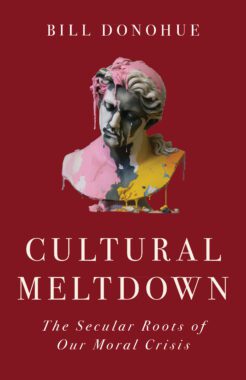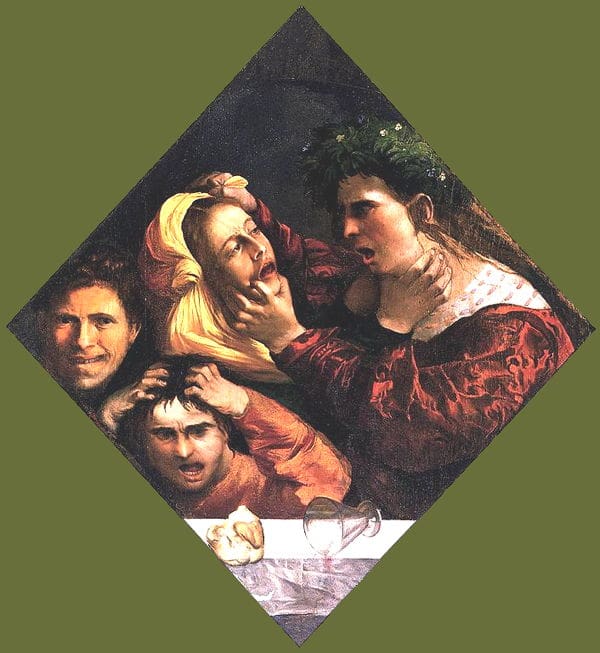A Reflection from “Cultural Meltdown” by Bill Donohue
Divided We Fall: Patriotism Matters
Many of the public policies that have created serious social problems are the result of good intentions gone awry. But some are the result of policies that were never directed toward achieving the common good: they are the result of decisions aimed at advancing a political agenda, rather than the best interests of society. “United we stand, divided we fall” is a phrase traceable to the sixth-century B.C. Greek storyteller Aesop. It is the message of his fable “The Four Oxen and the Lion,” in which four oxen survived against a lion as long as they stood back to back but, when they began to bicker and separated, were each devoured in turn. Jesus made a similar statement, one that has more currency for Americans today: “Every kingdom divided against itself will be laid waste, and no town or house divided against itself will stand” (Matt. 12:25). More recently, Cardinal Robert Sarah has noted, “The sign of Satan is division.”
This accurately describes the polarization that is abundantly evident in society today. It also reflects the clash between a religious vision of morality and a secular one. As we saw in the last two chapters, these two visions have wildly different notions of liberty. In this chapter, we will explore their dramatically different notions of equality.
The religious vision understands that every man and woman is made in God’s image and likeness, and that each possesses equal dignity, independent of social characteristics. We are called to work for the common good, and to bring people together. This certainly means treating everyone as an equal. But it does not mean that all existing inequalities are morally problematic. There is a difference between inequalities that develop as a result of different individual faculties, and inequalities that develop as a result of unfair treatment. We should all labor to promote justice. But it behooves us to acknowledge that, given the reality of sin, this labor is, and always will be, a never-ending effort.
The secular vision sees inequality as inherently unjust, even immoral, and therefore deserving of eradication. It discounts differences in talent and ambition, and focuses on socially contrived mechanisms that generate group inequalities. Most important, because it does not recognize the natural limits of the human condition, it believes that human perfectibility is possible. Unavoidably, the gap between the ideal and the real becomes cause for discontent, and even anger. This anger often manifests itself in socially divisive ways and treats appeals to the common good as sophistry.
The differences between these two visions of man and society are stark and irreconcilable. In short, the religious vision is realistic, and tempered by man’s sinful nature. The secular vision is utopian, and not tempered by anything. The elites in our society incline toward the secular vision. They are thus largely responsible for the social turmoil that exists.
Aquinas understood that man is “a social and political animal” that needs to check his self-interest for the common good. In every society, he said, there must be “some governing power” to direct people toward the “common good.” “The common good” is one of the four pillars of Catholic social teaching, the others being the “dignity of the person,” “subsidiarity,” and “solidarity.”261 All of these aspects of Catholic social thought are predicated on the need for social cohesion, a condition that is increasingly elusive.
Our lack of cohesion is manifested in many ways, one of which is the declining sense of patriotism. Aquinas maintained that reverence toward country “includes homage to all our fellow-citizens and to all the friends of our country.” The good news is that most Americans want a united country and are proud of their history. But there is a determined and well-organized effort on the part of left-wing activists to undermine those sentiments. This effort is rooted in a contempt for our religious heritage.
Steve Hochstadt is emeritus professor of history at Illinois College in Jacksonville, Illinois. He speaks for many in the professoriate today when he boasts, “I have not said that pledge [the Pledge of Allegiance] for many years,” owing, he says, to false statements about “liberty and justice for all” found in it. He is particularly angry about the phrase “one nation under God” in the pledge. He brands those words “un-American.”
What really gets Hochstadt’s goat (and the flocks of his ilk) is the persistence of patriotism in America. An international survey of nineteen countries conducted in 2023 concluded that “the United States is the most patriotic country, with 41% of its respondents answering ‘yes’ to ‘My country is the best country in the world,’ and 32% believe that the US is ‘better than most countries.’”
The same YouGov poll found that young people, those between the ages of eighteen and twenty-nine, were the least patriotic. So were Democrats.265 In another 2023 survey, Gen Z, the youngest adult age group, scored 57 percentage points lower on a patriotic scale than baby boomers. One obvious reason for this disparity is that many schools have adopted a highly critical perspective of American history in recent years. This is not an accident: it is the result of a determined left-wing agenda promoted by an increasing number of educators. Their intentional efforts are one reason we are so divided as a people. This takes on greater poignancy when we learn from other survey data that it is not the most affluent and highly educated Americans who are the most patriotic—it is the poor, those in the lowest income bracket.267
The American Creed Reconsidered
Much of the division affecting America today is driven by conflicts over race, and most of it centers on a long history of inequality. To her credit, the Catholic Church’s legacy with respect to race is comparatively good—not merely in her teachings but in her deeds. Not only has the Church long condemned slavery—St. Patrick, who was himself enslaved, was the first person in history known to publicly denounce it—but the abolitionist movement could not have succeeded without the reasoning reflected in natural law and in theories of natural rights.
As the Catechism of the Catholic Church explains, “Respect for the human person entails respects for the rights that flow from his dignity as a creature. These rights are prior to society and must be recognized by it.” Similarly, in 1963 Pope John XXIII wrote in his encyclical Pacem in Terris that “all men are equal by reason of their natural dignity,” and because of this, “racial discrimination can in no way be justified.”
From the period of slavery through to the period of racial inequities of the Jim Crow era, the handicaps placed on African Americans were many and lasting. But beginning in the 1940s, there has been a steady march toward justice and equality, though many in elite quarters seem blind to it.
War is one of the most important, if not the most important, catalysts for social change. The armed forces were integrated shortly after World War II, and it was in 1947 that Major League Baseball accepted Jackie Robinson as the first black man to play the game. In the decade that followed, the historic 1954 decision in Brown v. Board of Education ensured that the schools were integrated. In 1955, Rosa Parks became a national figure when she refused to give up her seat to a white passenger, as ordered to do by a white bus driver. It was then that a twenty-six-year-old Baptist preacher, Rev. Martin Luther King Jr., began his civil rights crusade.
To purchase this book, please visit one of the links below.
_

This article on ‘Trying Times: Can Society Redeem Itself?’ is adapted from the book Cultural Meltdown by Bill Donohue which is available from Sophia Institute Press.
Art for this post on a reflection from “Cultural Meltdown” by Bill Donohue; cover used with permission; Photo used in accordance with Fair Use practices.





